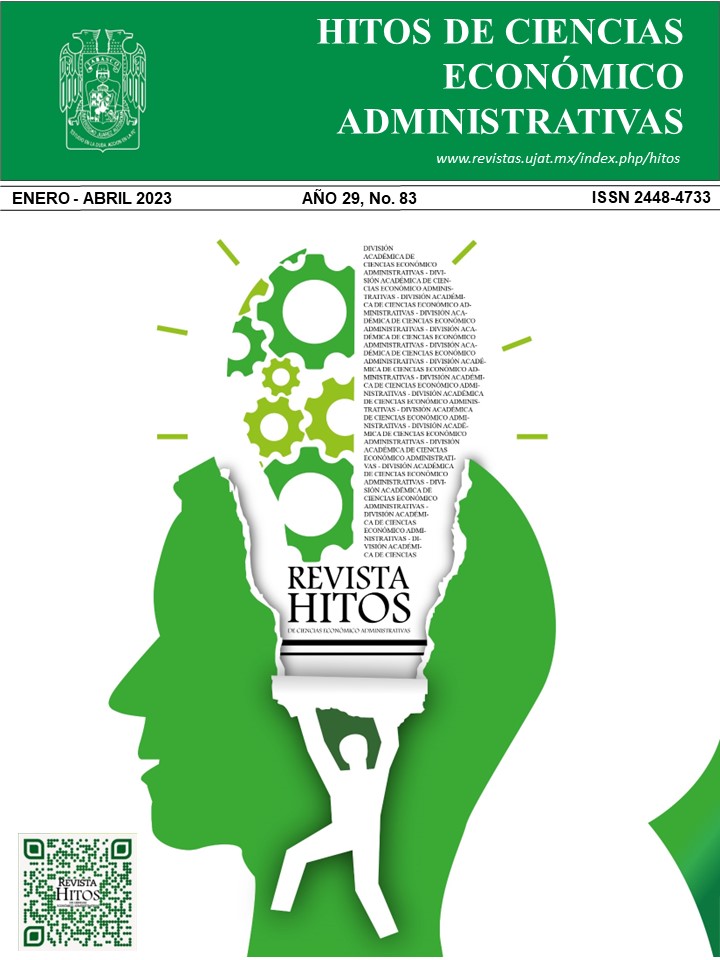Sentiment Analysis of Online Shopping based on Twitter and RStudio
DOI:
https://doi.org/10.19136/hitos.a29n83.5649Keywords:
Sentimental analysis, Online shopping, Qualitative, Security, Twitter.Abstract
OBJECTIVE: Identify opinions about online purchases in the period from April 25th to May 16th, 2022.
MATERIAL AND METHOD: The approach of this study is non-experimental, qualitative, through grounded theory, using the sentiment analysis technique to classify unstructured information in structured data of a text fragment as positive sentiment (> 0), negative (< 0) or neutral (0), based on tweets from the social network Twitter about #comprasenline; RStudio software was used for data processing.
RESULTS: They show that 50.9% of users perceive negative sentiment toward online purchases, while 40.8% consider online purchases positive.
CONCLUSIONS: The impact of the phenomenon of online shopping, despite being a new form of consumption and purchasing habit, is still not so accepted, since feelings or opinions continue to be judged about the security and guarantee of the supply, which must be counteracted by marketing strategies to encourage online purchases and the security provided by making them correctly.
Downloads
References
REFERENCIAS
Abd-Alrazaq, A., Alhuwail, D., Househ, M., Hamdi, M., y Shah, Z. (2020). Top Concerns of Tweeters During the COVID-19 Pandemic: Infoveillance Study. Journal of medical Internet research, 22(4), e19016. https://doi.org/10.2196/19016
Anaya, R., Castro, J. M. y González, E. (2020). Preferencias del consumidor Millennials respecto al diseño de webs de social commerce. Revissta Brasileira de Gestao de Negocios, 22(1), 123- 139. https://www.scielo.br/scielo.php?pid=S1806-48922020000100123&script=sci_arttext&tlng=es
Asociación Mexicana de Internet (2022). 18° Estudio sobre los Hábitos de Personas Usuarias de Internet en México 2022 AIMX. https://www.asociaciondeinternet.mx/estudios/habitos-de-internet
Asociación Mexicana de Ventas Online. (2021). AMVO. https://www.amvo.org.mx/
Boon-Itt, S. y Skunkan, Y. (2020). Public perception of the COVID-19 pandemic on Twitter: sentiment analysis and topic modelling study.JMIR Public Health Surveill. 6e21978 doi:10.2196/21978. https://publichealth.jmir.org/2020/4/e21978/
Caldito, L. A. (2005). Medición de las actitudes de los internautas respecto a la compra on-line. Segmentación en base a actitudes y caracterización de los segmentos identificados. Economic Analysis Working Papers (2002-2010). Atlantic Review of Economics (2011-2016), 4, 1-26. https://dialnet.unirioja.es/servlet/articulo?codigo=1111642
Florini, P., y Lipsky, L. (2012). Search marketing traffic and performance models. Computer Standards and Interfaces, 34(6), 517-526. https://doi.org/ doi:10.1016/j.csi.2011.10.008
Glaser, B y Strauss, A.(1967) The Discovery of grounded theory: Strategies for qualitative Research. Nueva Jersey: Aldine Transaction.
Herráez, B., Bustamante, D. y Saura, J. (2017). Information classification on social networks. Content analysis of e-commerce companies on Twitter. Revista Espacios, 38(52), 16. https://www.revistaespacios.com/a17v38n52/17385217.html
Honeycutt, C. & Herring, S. (2009). Beyond microblogging: Conversation and collaboration via Twitter. 42nd Hawaii International Conference on System Sciences. Hawaii. https://doi.org/doi: 0.1109/HICSS.2009.8
Juarez, C (2021) Mercado Libre: cuatro cambios en los hábitos de los consumidores por la pandemia. https://thelogisticsworld.com/logistica-y-distribucion/mercado-libre-cuatrocambios-en-los-habitos-de-los-consumidores-por-la-pandemia/
Li, Q., Quansheng, W. y Lin, Z. (2017). Effects of consumer visit to online community and product channel on local sales of large consumer goods: evidence from real estate industry. Journal of Strategics Information Systems, 27(1), 191-204. https://www.xmol.com/paper/1307871343436599296
Linero, J. y Botero, L. (2020). Hábitos de consumo en plataformas e-commerce en adultos jóvenes de la ciudad de Bógota. Universidad & Empresa, 22(38), 211-236. http://www.scielo.org.co/pdf/unem/v22n38/2145-4558-unem-22-38-211.pdf
Loor, J. L., Albán Navarro, A. D., Valdospin De Lucca, J. B., & Vera Gonzabay, D. E. (2018). E-commerce: un factor fundamental para el desarrollo empresarial en el Ecuador. Revista Científica Ecociencia, 5, 1–17. https://doi.org/10.21855/ecociencia.50.156
Martínez, R. I., Catache, M. del C., Pedroza, G. y Huerta, Z. M. (2022). El impacto del COVID-19 en la incidencia de compras en línea de los millenials. Revista Ingeniería y Gestión Industrial, 1(1). https://doi.org/10.29105/revig1.1-6
Mathews, S., Bianchi, C., Perks, K. y Wickramasekera, R. (2016). Internet marketing capabilities and international market growth. International Business Review, 25(4), 820-830. https://doi.org/doi:10.1016/j.ibusrev.2015.10.007
OCDE. (2020). Panorama del comercio electrónico, politicas, tendencias y modelos de negocio. OCDE, 35-76. https://www.oecd.org/sti/Panorama-del-comercio-electro%CC%81nico.pdf
Samuel J., Ali G., Rahman M., Esawi E., y Samuel Y. (2020) COVID-19 Public Sentiment Insights and Machine Learning for Tweets Classification. Information 2020 Jun 11;11(6):314.https://doi.org/10.1101/2020.06.01.20119347
Saura, J., Palos, P. y Ríos, M. (2018). Attitudes to environmental factors in the tourism sector expressed in online comments: An exploratory study. International Journal of Environmental Research and Public Health, 15(3), 553. https://doi.org/10.3390/ijerph15030553
Segura-Yánez , K.(2021) La nueva era digital del comercio y su influencia post-pandemia. Revista Saberes 5.0, 1(2), junio de 2021, pp. 118-32, https://saberescincopuntocero.com/ojs/index.php/rcs50/article/view/120.
Statista. (9 de mayo de 2022). Statista. https://es.statista.com/estadisticas/632410/valor-demercado-del-comercio-electronico-mexico/
Downloads
Published
Issue
Section
License
Copyright (c) 2023 Alejandra Vega Barrios

This work is licensed under a Creative Commons Attribution-NonCommercial-ShareAlike 4.0 International License.
As a requirement for the manuscript, the author is requested to provide the Copyright Assignment Letter, so that the Journal has the publication rights and to avoid plagiarism.
PLAGIARISM POLICIES
The Editorial Board of the Journal HITOS DE CIENCIAS ECONÓMICO ADMINISTRAIVAS has the authority to reject in the review process any manuscript that does not have adequate citation in the documents consulted in its scientific research work, which can be considered as plagiarism behaviors. Likewise, the referees carry out the plagiarism review using specialized software, such as iThenticate, among others.
COPYRIGHT POLICIES
Authors who have publications in the journal accept the following terms: • At the time the manuscript is accepted, the author transfers the copyright to the Journal HITOS DE CIENCIAS ECONÓMICO ADMINISTRATIVAS.
- The authors may make additional agreements for non-exclusive distribution of the published version of the article (e.g., including it in an institutional repository or publishing it in a book) provided that the initial publication in this journal is indicated.
- Authors are allowed and recommended to publish their research work on the Internet (eg, institutional or personal files), which would allow more beneficial exchanges to increase the citation of the published work.
This work is licensed under Creative Commons Attribution-NonCommercial-NoDerivatives 4.0 International





